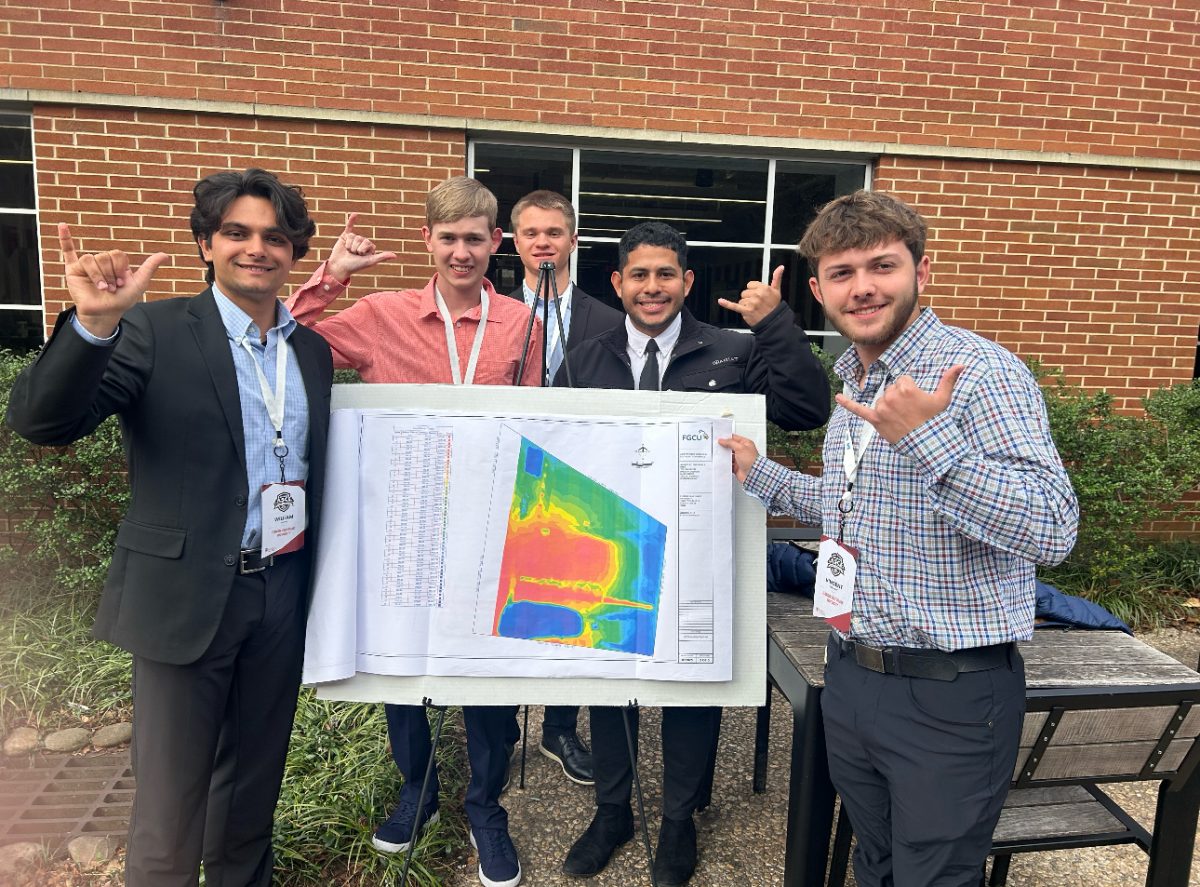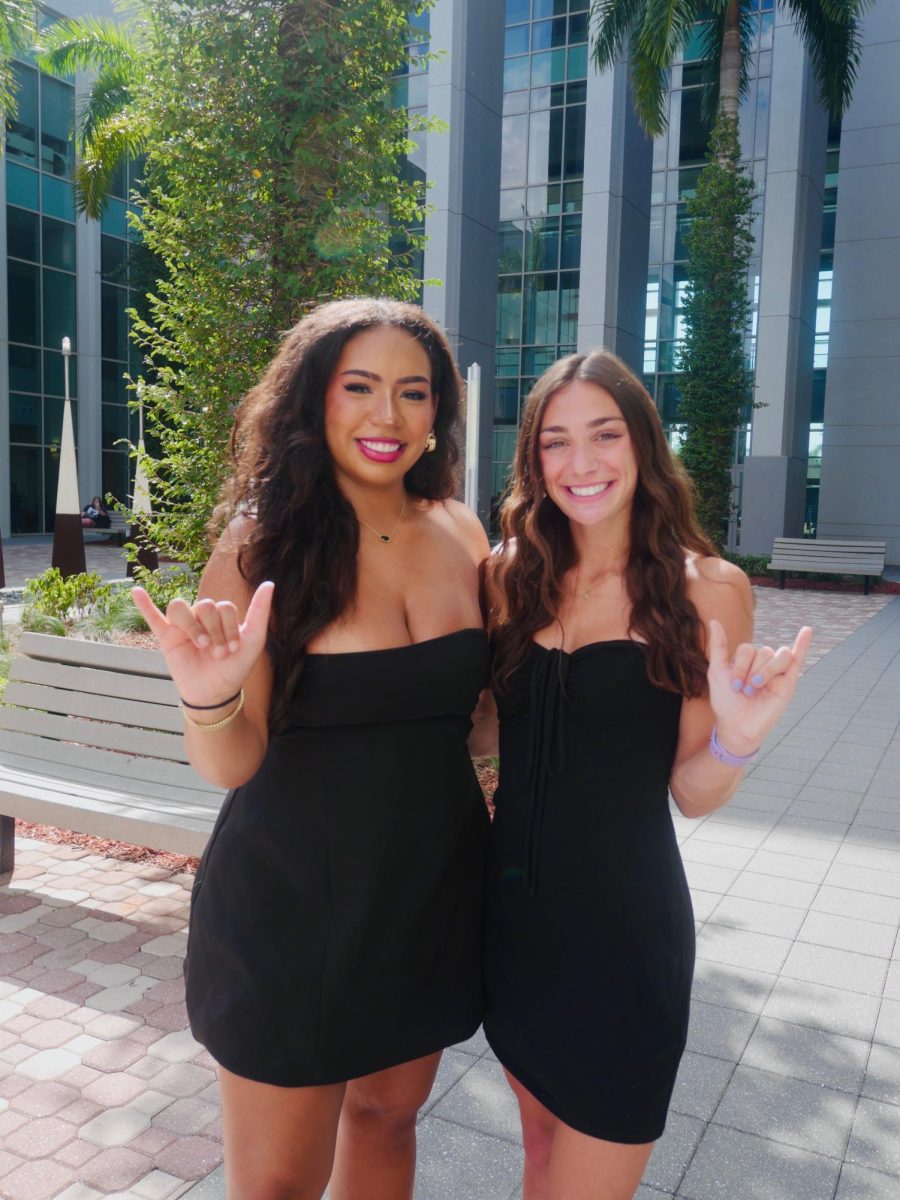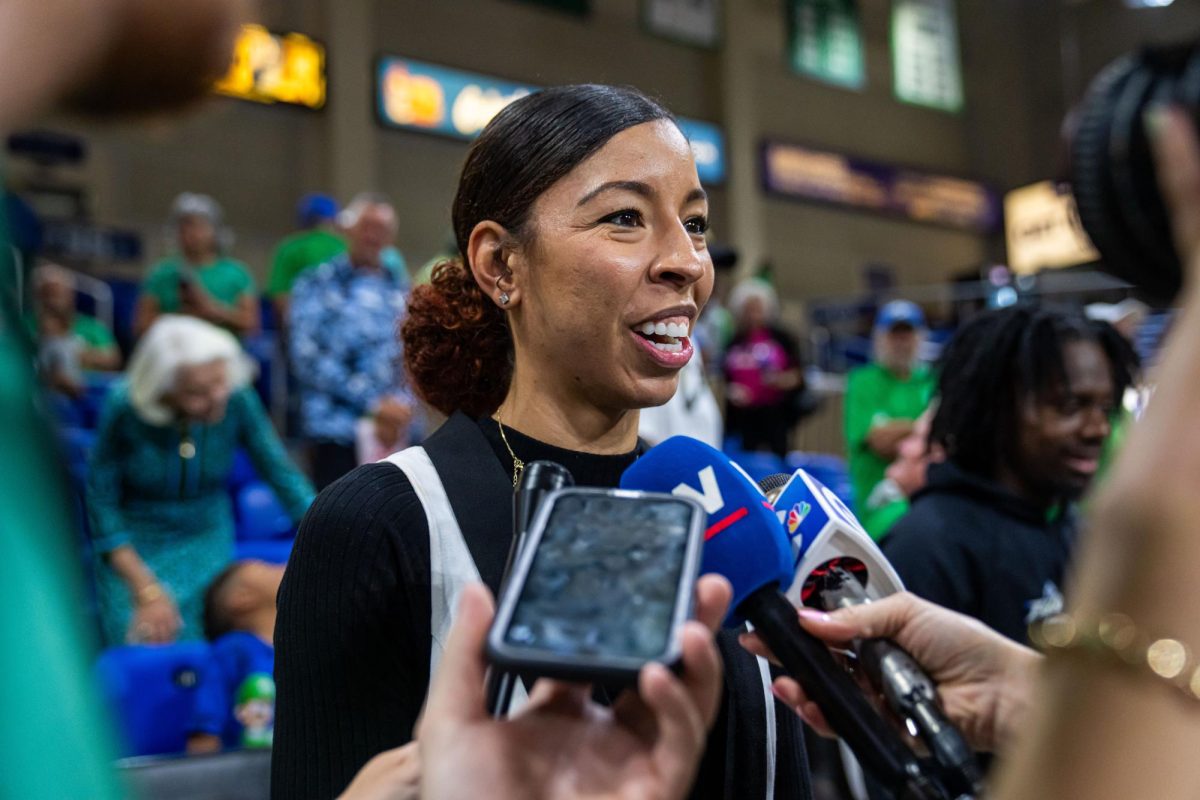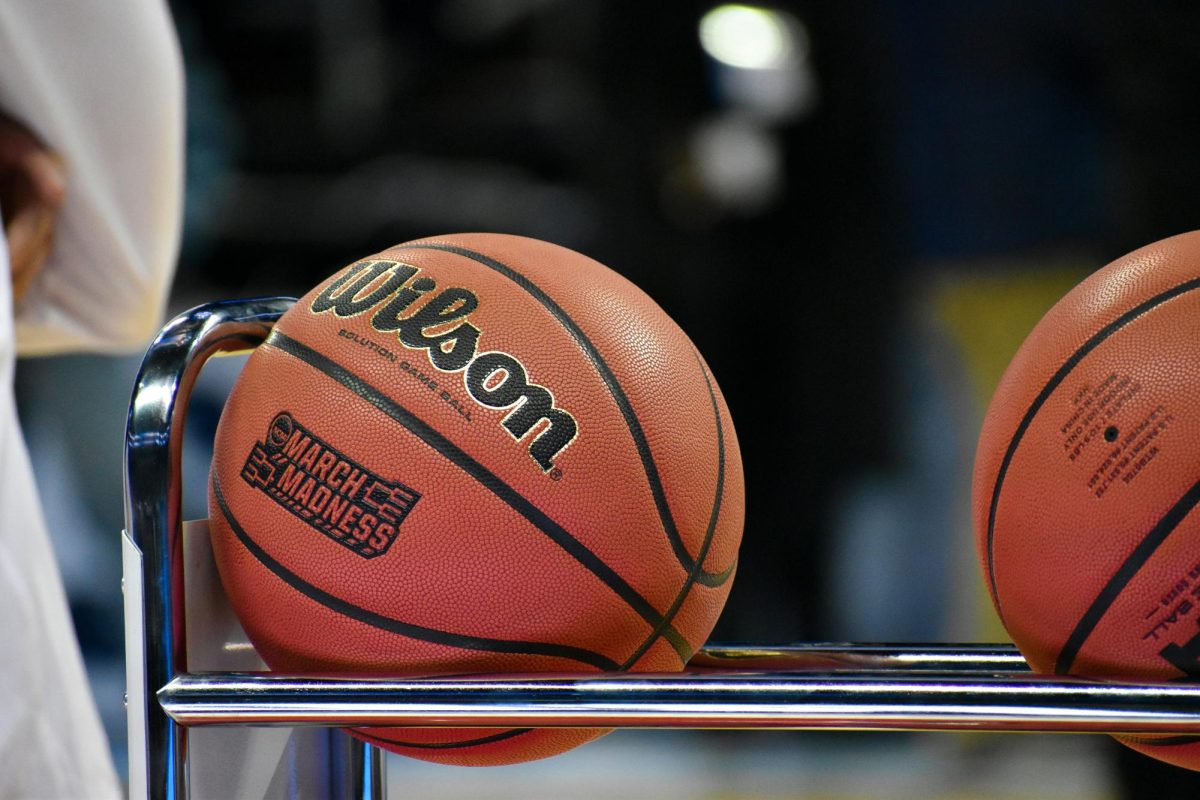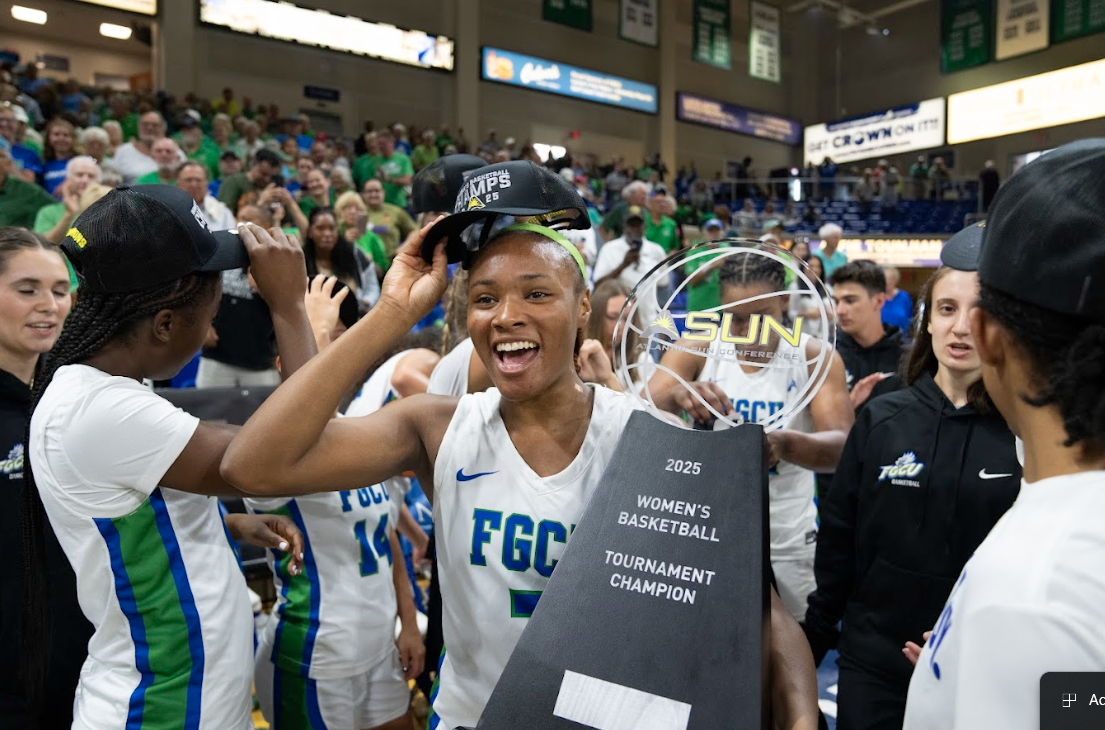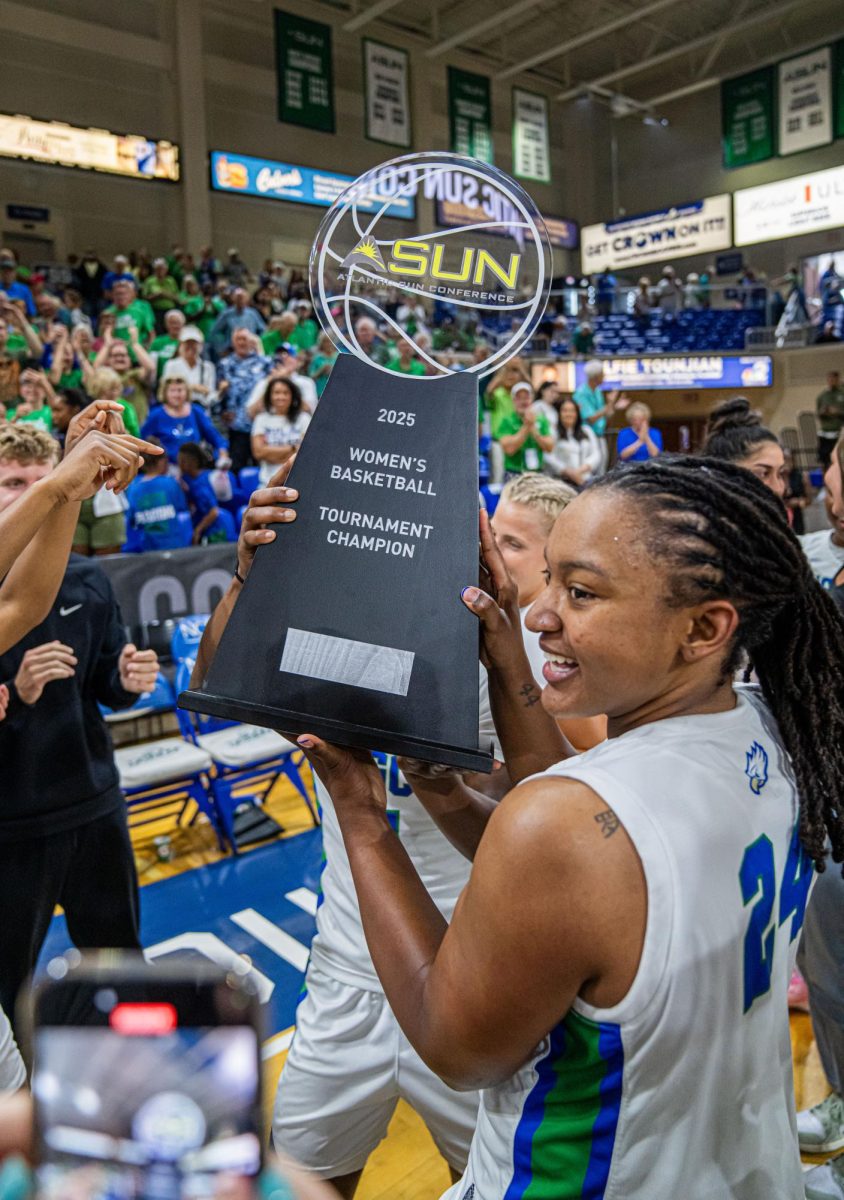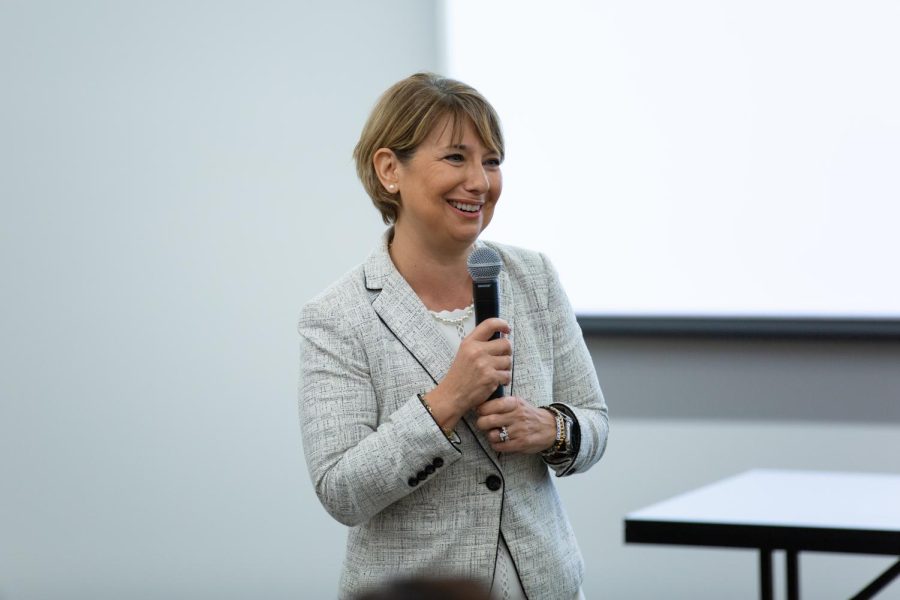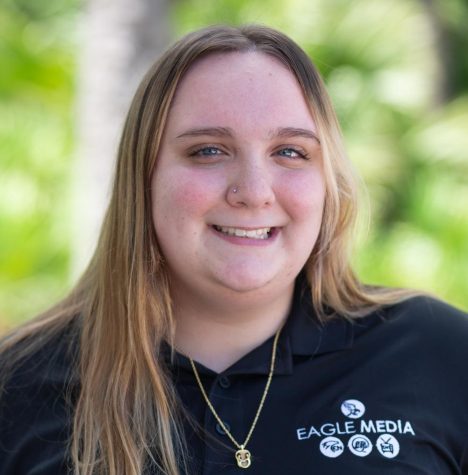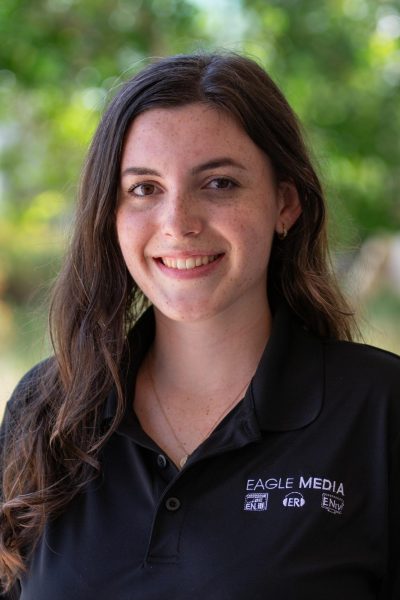Presidential Finalist Aysegul Timur Wants to Lead FGCU to the Next Step
The Second of Four Finalists To Host Public Forums
Dr. Aysegul Timur spoke at 3 public forums on campus to engage with students, faculty and staff members.
April 19, 2023
Aysegul Timur, Ph.D. attended three public forums held at the Water School on April 19 to give students, faculty and staff insight into what she’d continue to lead FGCU towards if chosen to be the fifth president.
Timur has worked at FGCU for four years and is currently the vice president and vice provost of Strategy and Program Innovation. She occasionally teaches classes at FGCU as well.
She is the second of four finalists to attend public forums for the continuation of the fifth presidential search. Student Government’s President Emory Cavin and Chief Justice Julianna Manes moderated the 11 a.m. to 12 p.m. public forum.
In Timur’s opening speech, she shared that she has been a part of many aspects of academic life: faculty member, classroom experience, research, scholarship, department chair, dean and senior vice president of Academic Affairs.
“All these experiences have contributed my unique perspective on on the importance of working with university-wide teams and key community stakeholders, such as you know, legislative members, elected officials, superintendents of schools, business leaders, nonprofit organizations, civic groups, and more and truly recognising the importance of a comprehensive, regional university in the community.”
She shares that she came to Southwest Florida 25 years ago, only fluent in Turkish, and had “an audacious goal to earn my Ph.D in one of the best higher education systems in the world.” She drove to Tampa from Naples four days a week for four years to complete her Ph.D.
What Do You Love About FGCU?
An anonymous submitted question asked Timur what she loves about FGCU. Timur said the people— students, staff and faculty.
“I can’t remember my past several years coming to FGCU even just not having a big smile on my face because I am absolutely working with incredible people here and we have really great students who are, you know, game changers for our region, they are getting ready to do that.” Timur said. “That makes me so excited about FGCU all the time, because I know that we are making [a] difference in our students in our community in the state of Florida.”
Most Pressing Issues for Students
An anonymous submitted question asked Timur how her past experiences will help students face, in her opinion, their most pressing issues. Timur said that when she teaches, she makes sure that she has one-on-one conversations with her students to give them an opportunity to share what they’re feeling.
She said that through COVID-19 and after Hurricane Ian, she’s heard students’ voices about how they’re struggling with balancing their time, readjusting to the realities of life after COVID, mental health impacting their education, worrying about finances, work schedules, all while trying to figure out their future.
“But one thing is that I am so confident as an FGCU family, we are surrounding our students with the great support that they know FGCU is here and making a difference for them,” Timur said.
Undergraduate Research
An anonymous submitted question asked Timur how she’d continue to support undergraduate research and how she sees the rich undergraduate research culture play a role with faculty research.
Timur said that undergraduate research is in FGCU’s DNA. She shared that Eagle X, happening this Friday, will showcase research that students have done this year. She said that creating new knowledge and encouraging students to hypothesize and creating new knowledge is an important skill set to have.
Sustainability: Economic, Equitable and Environmental
Senior Rory “Cush” Cushen asked Timur to explain her background in sustainability— economic, equitable and environmental— and if she has any ideas to enhance that identity.
Timur said that when she first started working on the micro-credentials initiative, she said that sustainability professionals or sustainability practitioners should be one of FGCU’s distinctive credentials.
“I agree with students that we have to define our distinction. You know, how we do sustainability, not only doing it here, but also what it means to our students, and how they take that knowledge and bring [it] to their professional and personal lives,” Timur said. “We started conversations already, I can tell you that it’s already in the implementation and we will continue to [move] forward.”
She said that when you go to the digital badges website, it reads “Coming Soon: Sustainability Professional.”
Personal and Professional Values
An FGCU senior asked to explain her leadership style and fundamental values as a person and as a professional. Timur replied that she’s a passionate, influential, inclusive, collaborative, adaptive and a team-building leader.
“Leadership means influence, inspiring people, but [making] it relevant to them so they can see themselves being part of the shared vision,” Timur said. “They have the sense of belonging to that mission so anything that we do, they know that they are part of it.”
She said that as a leader, she knows she can’t do everything by herself.
“My style is that [of] bringing all skills and attributes together, so we can really move the needle together,” Timur said.
Academic Success and Performance Metrics
An anonymous submitted question asked Timur how she believes performance metrics can be used to support academic success. She believes that if FGCU does systematic-wide actions for continuous improvement for student success, that the performance model will take care of itself.
“When we do the right things, graduating students on time, connecting them to careers, connecting them to jobs, these outcomes will happen naturally and organically. So to me, it’s not that oh, we are doing these things because we have the metric,” Timur said. “I think the model and the metrics are important for us. They are key performance indicators.”
She said the model is all about continuous improvement and looking at things from an innovative perspective.
“Removing barriers for students all the time. It’s not one time, it’s all the time. Having those conversations every day, all day. That’s how I see it,” Timur said.
Nearing Hispanic-Serving Institution Distinction
An anonymous submitted question asked Timur how she plans to further support Hispanic students, staff and faculty as FGCU approaches the Hispanic-Serving Institution distinction.
As an economist, Timur said she looks at demographic and economic indicators for community presentations. When she looked at Southwest Florida, she noticed the Hispanic student population is around 34% in the 2021 census.
“I keep asking, ‘okay, we haven’t made our mark for 25% and why?’” Timur said. “I keep saying universities must be relevant in the region they are in and what are the things that we should be doing systematically, what are the things that we are doing that attracting our Hispanic students to our campus?”
She said that having this designation is not just for Hispanic students, but for the entire FGCU community including faculty and staff.
“Because that designation would, you know, bring resources to us, maybe scholarships, maybe programs, maybe grants. [It] will benefit the entire FGCU community and the Southwest Florida community.”
Key Priorities and Strategic Planning
Brandon Hollingshead, an instructor in integrated studies, asked what Timur’s key priorities would be as president in regards to strategic planning.
She wants to innovate for student success after graduating with foundation and transferable skills and focusing on community engagement as well as growth.
“We are one of the model institutions now to create alternative credentials, micro credentials and digital badges and industry certifications. Why? Because we want to make sure that we listen to our business community, not only this region statewide and nationally, and preparing our students for today’s workforce and the future of work,” Timur said.
She said that FGCU’s name should be prominently displayed in all Southwest Florida counties, including Charlotte, Collier, Glades, Henry and Lee counties.
Student Involvement
Freshman Hannah Mathis asked how Timur will advocate for more student involvement, especially after the pandemic and Hurricane Ian.
“So my involvement in terms of student is more often communications, more feedback and input, maybe doing surveys, town hall meetings or going to students events, which you know me that I try to attend every single event,” Timur said. “My calendar for that reason is very booked, because again, they exactly tell us where the higher education is moving and what they want. I think it is very important that we get [that] firsthand information from our students. And I open all the communications possible.”
FGCU Athletics
Dr. Chris Blakely, assistant vice president and dean of students in Campus Life and serves on the university’s intercollegiate athletics committee, asked Timur how she would approach the long term economic viability of intercollegiate athletics, considering such items as NIL collective and NCAA conference realignment impacts.
Timur shared that she’s stunned when she goes to events and see’s that many students don’t attend even though FGCU has a distinct athletic culture. She said shes committed to making athletics more effective, efficient and productive.
“I think athletics are so important for academics too so they are so much complimentary, right? And I always look through data, when you look at it through data, our athletic students are over performing,” Timur said. “And I’m very proud of that, and using those and I think we need to do a much more strategic investment, much more strategic alignment for our athletic programs, and make sure that they are thriving.”
Higher Pay for Employees
An anonymous submitted question asked Timur how she would address the need for higher pay among staff and faculty.
“If I had my magical wand, and I would say here is the number, let’s do it. But also we have some realities of budgets wages and salaries and all kinds of other things,” Timur said. “But what I believe in for organizational success and institutional success is of course, helping everyone to have the salaries and wages that makes them happy personally and professionally.”
She said that while coming out of a pandemic and hurricane, Southwest Florida has gone through a lot.
“I think right now we are in that justification moat and I am sure when we sit down and do everything possible to make any adjustments for our outstanding faculty and staff,” Timur said. “That is my commitment, everything that we are capable of we will be doing it because you know, again, one thing I believe what makes us different is our people here at FGCU.”
Florida House Bill 999
An anonymous submitted question asked Timur how she would best address HB 999 to support students and FGCU. Timur said that she’s been studying the bill. She found that area about workforce development was a good part of the bill.
“And then when it comes to tenure, you know, especially for faculty tenure, and evaluations post-tenure review, and I just turn to FGCU and I said, well, 25 years ago, we structured our institution to be much more dynamic, much more flexible and so with that, you know, that part really does not apply to us,” Timur said.
She also mentioned that some of the areas of concern of the bill have been edited and it’s looking much better than how it was proposed at the beginning.
“I know that FGCU is nimble, flexible, adaptive, and innovative,” Timur said. “And if it’s a law, it’s a law. We will implement but we will find our ways, how to implement and find the best thing for ourselves based on FGCU’s mission. That’s how I see it, and I know that we can figure it out.”
FGCU’s Agricultural Impact
Steve Smith, the executive vice president of Gulf Citrus Growers Association, asked if Timur thinks it’s important to recognize FGCU’s agricultural history as part of FGCU’s distinction and sustainability.
Timur said that she’s seen how much the agriculture industry has changed through data analytics and drone technologies.
“I think we have incredible opportunities here to advance what we offer for [the] agricultural industry and maybe through microcredentials, maybe in so many other ways that we can continue to align with [the] agricultural industry and we become one of the universities that has expertise in those areas,” Timur said. “And early on you and I spoke about our connection to [the] agricultural community here that we need to start documenting those things that we do in the agricultural industry, and maybe writing case studies for agricultural industry and share statewide and nationwide and there is a lot to do with agricultural industry.”
In Timur’s closing statement, she said that she is honored to be a candidate for presidency and wants to take FGCU to the next level.
“I know that collaboratively, we can do a lot more, we have done incredible work, we are in incredible momentum for FGCU and we can continue to do that,” Timur said.
Public comments are encouraged through a survey that will remain open until Friday, April 28 at 5 p.m. All submissions are subject to public records and will be reviewed by the Board of Trustees before final interviews take place on Thursday, May 4 in the Cohen Student Union.

